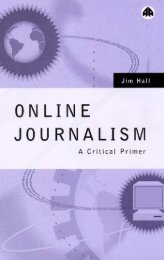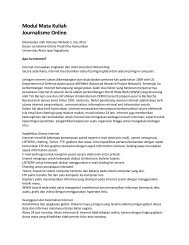1What is online journalism? - Ayo Menulis FISIP UAJY
1What is online journalism? - Ayo Menulis FISIP UAJY
1What is online journalism? - Ayo Menulis FISIP UAJY
Create successful ePaper yourself
Turn your PDF publications into a flip-book with our unique Google optimized e-Paper software.
The core journal<strong>is</strong>m 51<br />
directly on what the politician’s meeting <strong>is</strong> about. The ‘general’ <strong>is</strong><br />
your knowledge of current affairs, including any background to<br />
the politician’s meeting. The latter <strong>is</strong> often a lifeline – hence, the<br />
old adage that the journal<strong>is</strong>t should know a little about a lot.<br />
Th<strong>is</strong> general research should be effortless for journal<strong>is</strong>ts. Their<br />
interest in information, communication and what <strong>is</strong> going on in the<br />
world should ensure that they are fully briefed on current affairs.<br />
Sadly, th<strong>is</strong> <strong>is</strong> often not the case.<br />
Plan an interview structure<br />
As you research, a possible structure and direction for the<br />
interview will begin to emerge. Do not fight th<strong>is</strong> inclination. It <strong>is</strong><br />
not cramping your style. It will enhance it.<br />
Start by identifying key areas for the interview. Then boil these<br />
down to key points. Print them on a piece of paper as bullet points.<br />
Never write down your questions verbatim in a numbered l<strong>is</strong>t. If<br />
you do, you will spend the interview with your head buried in your<br />
notepad, reading instead of writing and l<strong>is</strong>tening. You will also<br />
become inflexible, asking a question simply because it <strong>is</strong> the next<br />
one on your l<strong>is</strong>t, even though it may have been unexpectedly dealt<br />
with by a previous answer.<br />
You should aim to establ<strong>is</strong>h a relationship with your interviewee.<br />
That may be as an equal, confidante, counsellor or even<br />
confessor. In face-to-face interviews, th<strong>is</strong> requires firm eye contact<br />
and positive body language. You can do neither if you are preoccupied,<br />
trying to read your next question and wondering if it <strong>is</strong><br />
still appropriate.<br />
If you put your key points down as bullets, in large type, with<br />
spaces between them, you can read them at a glance, keep track<br />
of the content and direction of the interview but also be free to<br />
depart th<strong>is</strong> loose ‘script’ at a moment’s notice. Indeed, you may<br />
want to do that, if you are exerc<strong>is</strong>ing the most important of your<br />
senses for successful interviews – if you are l<strong>is</strong>tening.<br />
L<strong>is</strong>tening skills<br />
Nervous student journal<strong>is</strong>ts understandably focus much of their<br />
attention on what they are saying when they do their first
















